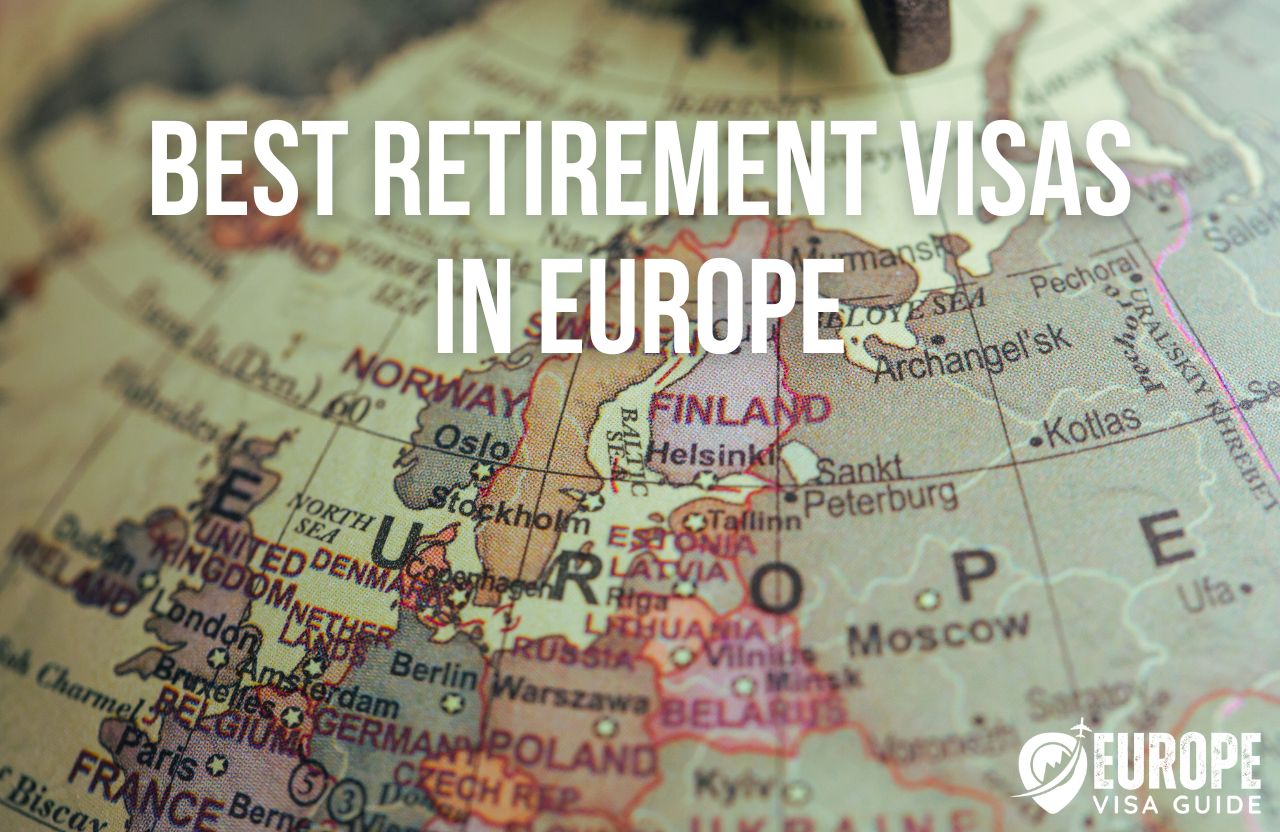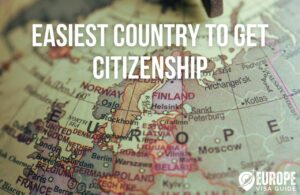
Table of Contents
Are you considering a move to Europe and looking for the best retirement visa options? Europe offers a range of retirement visas that provide accessible pathways to EU citizenship. These visas, sometimes known as “passive income visas” or “visas for those of independent means,” are designed for individuals who are financially self-sufficient and can support themselves without relying on benefits from the country’s taxpayers. In this article, we will explore the top 9 retirement visas in Europe for 2024.
What Are Retirement Visas?
Retirement visas, despite their name, are not limited to pensioners. These visas are available to individuals who can demonstrate financial self-sufficiency, regardless of their age or employment status. The main requirement for a retirement visa is to prove that you have sufficient income to support yourself without relying on the country’s welfare system. These visas are also popular among non-EU citizens seeking a pathway to EU citizenship.
It’s important to note that retirement visa pathways require full-time residency in the chosen country, which means becoming a tax resident and paying taxes on worldwide income. It’s always advisable to consult a cross-border tax advisor before planning a relocation.
Now, let’s explore the top 9 retirement visas in Europe for 2024. These countries with retirement visas, retirement visa countries, allow individuals to retire in countries with retirement visas, retirement visa countries, offering a variety of benefits for retirees. Whether you are looking for a peaceful countryside or a vibrant city experience, these countries with retirement visas, and retirement visa countries, provide an array of options to suit your preferences. So, without further ado, let’s delve into the details of the top 9 retirement visas in Europe for 2024.
#1. Portugal D7 Visa
Timeline to Citizenship: 5 years
Dual Citizenship Allowed? Yes
Language Level Required: A2 Portuguese
Portugal retirement visa, also known as the D7 visa or passive income visa, is highly appealing to those seeking retirement in Europe. Retiring in Portugal, with retirement visas being available, is a popular choice for many individuals. The minimum income requirement for these retirement visas in Portugal is just €860 per month, which is based on the current national minimum wage in Portugal. Various types of income, including pensions, rental income, dividends, investments, or royalties, can be considered for the retirement visa application. The retirement visa application process for Portugal retirement starts at the Portuguese consulate in your country of citizenship or permanent residence.
#2. Spain Non-Lucrative Visa
Timeline to Citizenship: 10 years
Dual Citizenship Allowed? No
Language Level Required: A2 Spanish
Spain offers another retirement visa option for non-EU retirees, although it is not as favorable as the Portuguese route. The Spain retirement visa is known as the “Non-Lucrative Visa.” It has higher annual income requirements compared to Portugal, with a minimum threshold of €25,816 per year. This amount is over three times higher than Portugal’s requirement. Moreover, Spain is less flexible regarding remote work salary as a valid type of income. Remote work salaries are typically not accepted for non-lucrative visa applications. Spain also requires 10 years of full-time residency before you can apply for citizenship. Additionally, Spain does not recognize dual citizenship, so you may have to give up your existing passport.
#3. Greece Retirement Visa
Timeline to Citizenship: 7 years
Dual Citizenship Allowed? Yes
Language Level Required: B1 Greek
Greece offers a retirement visa known as the “Residence Permit for Financially Independent Persons.” This visa provides a reasonable pathway to EU citizenship. The minimum passive income required is €24,000 per year, and it is possible to work remotely for non-Greek employers or clients while residing in Greece with this visa. After living full-time in Greece for seven years and passing a Greek language exam, you can apply for Greek citizenship. Permanent residency is obtainable after five years of full-time residency in Greece, but it does not grant EU freedom of movement.
#4. Italy Retirement Visa
Timeline to Citizenship: 10 years
Dual Citizenship Allowed? Yes
Language Level Required: B1 Italian
Italy offers the Elective Residency Visa, which is a retirement visa with a high passive income requirement of €31,000 per year. This visa does not allow you to work while residing in Italy, even for an overseas employer. After five years of full-time residency in Italy, you can apply for a permanent residence permit. Citizenship applications can be submitted after 10 years of residency. To qualify for Italian citizenship, you will need to pass an Italian language exam at the B1 level according to the Common European Framework for Languages.
#5. Malta Retirement Visa
Timeline to Citizenship: 5 years
Dual Citizenship Allowed? Yes
Language Level Required: Only English
Retiring in Malta is possible through the Global Residence Program, which serves as Malta’s retirement visa. One of the program’s requirements is purchasing property with a minimum value of at least €220,000 or renting for a minimum of €8,750 per year (varying slightly depending on the location). Citizenship applications can be submitted after five years of temporary residency. English is one of Malta’s official languages, so there is no need to pass a language exam. However, in practice, very few people on the retirement visa route are accepted as citizens after just five years. The fastest way to obtain Maltese citizenship is through the citizenship by investment program, which grants an EU passport after 12 months.
#6. Cyprus Category F Visa
Dual Citizenship Allowed? Yes
Timeline to Citizenship: 7 years
Language Level Required: None
Cyprus offers one of the lowest minimum income requirements among retirement visas in Europe. To be eligible, you need an annual income of just €9,568, which can come from pensions, overseas rentals, dividends, royalties, or investments. English is widely spoken in Cyprus, and there is no language exam or interview required for citizenship applications. You can apply for Cypriot citizenship after at least seven years of full-time residency.
#7. Latvia Retirement Visa
Dual Citizenship Allowed? (Depends on current nationality)
Timeline to Citizenship: 10 years
Language Level Required: B1 Latvian
Latvia has the lowest minimum income requirement among all retirement visas in Europe. To be eligible, you need an income of just €8,160. Latvia allows you to work remotely for non-Latvian employers or clients during your residency period. The timeline to Latvian citizenship is 10 years, and you will need to pass a Latvian language exam. Dual citizenship is not always recognized, and depending on your country of origin, you may need to give up your original passport to naturalize in Latvia.
#8. Austria Retirement Visa
Dual Citizenship Allowed? No
Timeline to Citizenship: 10 years
Language Level Required: B1 German
Austria offers one of Europe’s best standards of living and has one of the highest income thresholds for its retirement visa, officially known as the “gainful employment excepted visa.” The minimum annual income required is €23,199 from passive sources such as pensions, rentals, dividends, or investments. Austrian citizenship can be applied for after 10 years of full-time residency and passing a German language exam at the B1 level. Permanent residency can be obtained after five years, but Austria does not recognize dual citizenship.
#9. Luxembourg Residency for Private Reasons
Dual Citizenship Allowed? Yes
Timeline to Citizenship: 5 years
Language Level Required: A2 level spoken, B1 comprehension in Luxembourgish
Luxembourg offers a fast pathway to citizenship through its residency for private reasons program. To be eligible, you must have sufficient income to support yourself. The residency permit can be renewed after three years, with a minimum requirement of five years for gaining Luxembourg citizenship. The Ministry evaluates your resources based on their nature and regularity, comparing them to Luxembourg’s monthly minimum wage for unskilled workers. Luxembourg does not require a language exam for citizenship, although A2 level spoken and B1 comprehension in Luxembourgish are recommended.
Before you make your decision…
Retiring in Europe with one of these retirement visas can provide an interesting pathway to EU citizenship for individuals with independent means. Each country has its own requirements and restrictions, so it’s important to consider all factors before making a decision. Based on our research, the Portugal D7 visa stands out as the best and most flexible option for retirement in Europe. It offers a fast timeline for citizenship, low language requirements, and the possibility of benefiting from a preferential tax situation. Additionally, Portugal recognizes dual citizenship, eliminating the need to give up your original passport.
Conclusion
Europe offers a range of retirement visa options for individuals looking to retire and obtain EU citizenship. These visas require financial self-sufficiency and provide accessible pathways to residency and eventual citizenship. The top 9 retirement visas in Europe for 2024 include the Portugal D7 Visa, Spain Non-Lucrative Visa, Greece Retirement Visa, Italy Retirement Visa, Malta Retirement Visa, Cyprus Category F Visa, Latvia Retirement Visa, Austria Retirement Visa, and Luxembourg Residency for Private Reasons. Each visa has its own requirements, timeline for citizenship, and language level requirements. Before making a decision, it’s essential to thoroughly research each option and consult with experts to ensure a smooth and successful transition to retirement in Europe.





